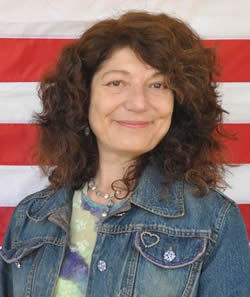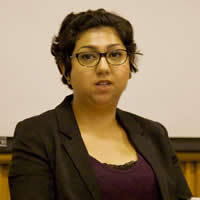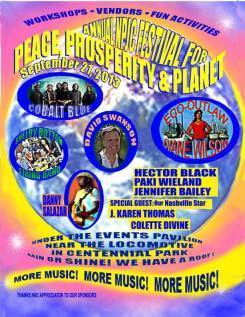David Swanson's Blog, page 133
September 25, 2013
Talk Nation Radio: Taking Kent State to the United Nations

https://soundcloud.com/davidcnswanson/talk-nation-radio-taking-kent
Laurel Krause is the cofounder and director of the Kent State Truth Tribunal. Her sister Allison Krause was killed at Kent State University on May 4, 1970, along with three other peacefully demonstrating students. Laurel and her colleagues are taking new evidence of state-ordered and orchestrated killing to the High Commissioner of the UN Human Rights Committee on October 17 & 18 in Geneva, Switzerland. See http://TruthTribunal.org
"What's the matter with peace? Flowers are better than bullets." -- Allison Krause on May 3, 1970.
Total run time: 29:00
Host: David Swanson.
Producer: David Swanson.
Music by Duke Ellington.
Download or get embed code from Archive or AudioPort or LetsTryDemocracy.
Syndicated by Pacifica Network.
Please encourage your local radio stations to carry this program every week!
Past Talk Nation Radio shows are all available free and complete at
http://davidswanson.org/talknationradio
Top 45 Lies in Obama's Speech at the U.N.
1. President Obama's opening lines at the U.N. on Tuesday looked down on people who would think to settle disputes with war. Obama was disingenuously avoiding the fact that earlier this month he sought to drop missiles into a country to "send a message" but was blocked by the U.S. Congress, the U.N., the nations of the world, and popular opposition -- after which Obama arrived at diplomacy as a last resort.
2. "It took the awful carnage of two world wars to shift our thinking." Actually, it took one. The second resulted in a half-step backwards in "our thinking." The Kellogg-Briand Pact banned all war. The U.N. Charter re-legalized wars purporting to be either defensive or U.N.-authorized.
September 23, 2013
Listen to Marcy Winograd, Guest-Hosting for Lila Garrett on KPFK's CONNECT THE DOTS!
Which Aired Today, Monday, September 23rd, 7:00 AM at KPFK Archives:
http://archive.kpfk.org/mp3/kpfk_130923_070004ctd.MP3
It might take a few minutes to download. - KPFK 90.7 FM Radio - www.kpfk.org
Don't miss Marcy's incredibly right-on opening about the use of chemical
weapons by the United States over the decades.
Then hear Marcy interviewing David Swanson, author of "WAR IS A LIE" and
other books, talking about U.S. wars.
www.davidswanson.org/warisalie
Marcy then talks with Dr. Michael Powelson, who is running for Congress
against Brad Sherman in the Valley as a member of the Green Party.
www.powelsonforcongress.wordpress.com
And finally Marcy talks with Jose Lara: www.votejoselara.com & Dr. Suzie
Abajian: www.suzieabajian.com - who are both running for local School
Boards.
Marcy is so good she should have her own program on KPFK.
In Peace,
Frank Dorrel
Publisher
Addicted To War
A Tale of Two Congress Members
In 2010 in Virginia's Fifth Congressional District, many people who prioritize peace over war probably voted for Democrat Tom Perriello over Republican Robert Hurt. I know many who did just that.
Here's what Congressman Hurt said on Tuesday about Syria:
September 22, 2013
Ending One War, Ending All Wars
Remarks on September 21, 2013, at the Nashville Festival for Peace, Prosperity, and Planet.
Thank you to Elizabeth Barger and the Nashville Peace and Justice Center and to all of you, and happy International Day of Peace!
September 19, 2013
Frank Kellogg's Peace Treaty
We've collectively forgotten what was probably the single biggest news story of 1928. It is little known and even less appreciated that the United States is party to a treaty that bans all war. This treaty, known as the Kellogg-Briand Pact, or the Peace Pact, or the Renunciation of War, is listed on the U.S. State Department's website as in force. The Pact reads:
"The High Contracting Parties solemly [sic] declare in the names of their respective peoples that they condemn recourse to war for the solution of international controversies, and renounce it, as an instrument of national policy in their relations with one another.
"The High Contracting Parties agree that the settlement or solution of all disputes or conflicts of whatever nature or of whatever origin they may be, which may arise among them, shall never be sought except by pacific means."
Pacific means only. No martial means. No war. No targeted murder. No surgical strikes.
The story of how this treaty, to which over 80 nations are party, came to be is inspiring. The peace movement of the 1920s that convinced U.S. Secretary of State Frank Kellogg from St. Paul, Minn., to work for it was a model of dedication, patience, strategy, integrity, and struggle.
Playing a leading role was the movement for "outlawry," for the outlawing of war. War had been legal until that point. Following World War I, atrocities could be objected to but not the launching of war, and not the seizing of territory. The Kellogg-Briand Pact changed that.
With the creation of the peace pact, wars were avoided and ended. But nations continued to arm themselves and to support the rise of militaristic governments. Following World War II, President Franklin Roosevelt used the Kellogg-Briand Pact to prosecute the losers of the war for the brand new crime of war. From that day to this, despite an endless plague of war on and among the poor nations of the world, the wealthy armed nations have yet to launch a third world war among themselves.
When not simply ignored or unknown, the Kellogg-Briand Pact is dismissed because World War II happened. But what other legal ban have we ever tossed out following the very first violation and what appears to have been a quite effective prosecution?
An argument can also be made that the U.N. Charter undoes the peace pact simply by coming later in time. But this is by no means an easy argument, and it requires understanding the U.N. Charter as the re-legalization of war rather than the ban on war that most people imagine it to be. While Frank Kellogg's treaty bans all war, the U.N. Charter allows wars that are either defensive or U.N.-authorized.
In fact, the Kellogg-Briand Pact has continued to be used in international law, including in a case at the World Court in 1998 that arguably prevented a U.S. war against Libya.
Eliminating war, the outlawrists believed, would not be easy. A first step would be to ban it, to stigmatize it, to render it unrespectable. A second step would be to establish accepted laws for international relations. A third would be to create courts with the authority to settle international disputes. The outlawrists took the first big step, but we haven't followed through.
We should.
Supporters of torture and unlimited election spending and all sorts of dubious innovations point to court proceedings marginalia, overridden vetoes, speeches, and tangentially related ancient precedents, but not laws.
Supporters of peace have a law that can be pointed to, and a stronger one than the U.N. Charter. As long as some wars are deemed legal, supporters of any war will argue for its legality.
But how do you enforce a ban on war, without using war to do it? There are other means. If Canada were to invade the U.S., Americans could refuse to cooperate with the occupation, Canadians could refuse to take part in it, activists from around the world could come to the U.S. as human shields. The world's governments could condemn, ostracize, sanction, and prosecute the Canadian war-makers. In other words, war could be resisted using tools other than war. (Sorry for the example, Canada! I am aware which nation has a history of invading the other.)
There's a song from 1950 that describes the scene on August 27, 1928:
Last night I had the strangest dream, I ever dreamed before.
I dreamed the world had all agreed to put an end to war.
That was Frank Kellogg's dream. It's time we started dreaming it again.
September 18, 2013
Talk Nation Radio: Iraqi Students in the U.S.

https://soundcloud.com/davidcnswanson/talk-nation-radio-iraqi
The Iraqi Student Project has brought Iraqi students, refugees from the U.S. war on Iraq, to the United States to study, make friends, and build understanding. Students have come from refugee families living in Syria, which now has its own violence, to which the U.S. is contributing. The Project's office in Damascus has been closed, but Iraqi students are currently studying at U.S. universities, and you can get involved and help them. We speak with Farah Muhsin Al-Mousawi, an Iraqi citizen and former student representative with the Iraqi Student Project. We also speak with the project's Executive Director Robert Rosser, a college professor who has taught EFL and ESL in Mexico, Saudi Arabia, and Thailand, and communications and humanities in South Korea, Japan, Spain, Kuwait, and Italy. See http://IraqiStudentProject.org
Total run time: 29:00
Host: David Swanson.
Producer: David Swanson.
Music by Duke Ellington.
Download or get embed code from Archive or AudioPort or LetsTryDemocracy.
Syndicated by Pacifica Network.
Please encourage your local radio stations to carry this program every week!
Past Talk Nation Radio shows are all available free and complete at
http://davidswanson.org/talknationradio
September 17, 2013
Give the Sierra Club Credit for Taking on the U.S. Marine Corps
In this moment in which the public will and a bit of nerve in Congress have made refusing to let a president launch a bunch of missiles into a foreign country a reality and therefore mainstream and respectable (rather than vaguely treasonous as it might have been widely understood a decade ago or depicted by the corporate media a couple of weeks ago), there are signs of possible wider outbreaks of sanity.
Syria's crisis was brought on in part by climate induced drought and water shortage. The solution of sending in missiles (blocked for now) or of sending in guns (underway as we speak) misses that source of the problem and in fact exacerbates it. The U.S. military is our greatest consumer of petroleum, which it consumes in the course of fighting wars and occupying countries to control petroleum. Add in the depleted uranium, napalm, cluster bombs, white phosphorous, and other weapons use and testing, and one would think that environmentalists, sooner or later, would at least notice the existence of the U.S. military as a problem to be dealt with. Consider that the roughly $1 trillion spent by the United States and roughly $1 trillion spent by the rest of the world on militarism every year could coat the planet with sustainable green energy sources beyond the wildest imaginings of those sources' proponents, and you'd think war addiction would be the first thing environmentalists would want to cure.
Typically, you'd be disappointed. Every once in a while, there are signs of possible progress. Some environmental groups have spoken up against the naval base construction on Jeju Island. And the Sierra Club is now speaking up boldly and straightforwardly against the U.S. Marine Corps' plan to identify and destroy a new Vieques (the Puerto Rican island destroyed by U.S. bomb testing over decades). The Marines have found a rich and beautiful island, falsely called it desolate and uninhabitable (despite the fact that many species live there, including homo sapiens), and proposed to render it just that. The Sierra Club is among those calling the Marines on the lie and the outrageous proposal:
Pagan Island, one of a string of volcanic islands that make up the Commonwealth of the Northern Marianas (CNMI), is an ancient home to the Chamorro people and the habitat of unique animals and plants, many of them endemic, rare and endangered. Those natural and cultural resources are being put at risk by a plan by the U.S. Marines to use the island as a live-fire training ground. In scoping documents related to the environmental impact statement required for that plan to go forward, the Marines have characterized Pagan Island as being "desolate and uninhabitable." Photographs included below show how untrue this is.
Under a contract with the U.S. Fish and Wildlife Service, Sierra Club member Mike Hadfield of the University of Hawaii and his research team spent two weeks on Pagan Island, traversing it and cataloging biological resources found there. ...
Pagan Island has been inhabited by Chamorro people for more than 2,000 years, as attested by remains of ancient villages. It continues to be the home of a small population of Chamorros, and many more want to return to their ancestral homelands. Recent articles from Marianas newspapers, which can be found on the Save Pagan Island website, tell of the connection many people feel with Pagan and other northern islands and their desire to return to them. ...
A transfer of our major resources from war making to environment saving is the clearest path to survival and prosperity, so every time a bridge is built between peace and environmental activism is a moment worth celebrating.
September 16, 2013
Humanitarian Murder
This past Sunday night on "60 Minutes" John Miller of CBS News said, "I've spoken with intelligence analysts who have said an uncomfortable thing that has a ring of truth, which is: the longer this war in Syria goes on, in some sense the better off we are."
Now, why would that be uncomfortable, do you suppose? Could it be because encouraging huge numbers of violent deaths of human beings seems sociopathic?
The discomfort that Miller at least claims to feel is the gauge of our moral progress, I suppose, since June 23, 1941, when Harry Truman said, "If we see that Germany is winning, we ought to help Russia, and if Russia is winning we ought to help Germany, and that way let them kill as many as possible."
On Monday, Time magazine's Aryn Baker published an article under the headline "Syria's Rebels Turn on One Another, and That's Not a Bad Thing." Baker's point wasn't that more would die this way, but that this would allow the U.S. to escalate the war (which of course would mean more dying).
Remember that President Obama's reason for wanting to attack Syria is to "confront actions that are violating our common humanity." How is it that support for mass killing rarely seems to violate our common humanity if it's that other 96 percent of humanity getting killed, and especially if it's this 4 percent doing it? Why is the excuse to kill more people always that people are being killed, while we never starve people to prevent them from starving or rape people to protect them from rape?
The uncomfortable "60 Minutes" interviewer addressed his remarks to a former CIA officer who replied by disagreeing. He claimed to want the war to end. But how would he end it? By arming and aiding one side, just enough and not too much -- which would supposedly result in peace negotiations, albeit with a risk of major escalation. While nobody ever works to extend peace in order to generate war, people are constantly investing in war in the name of peace.
As this man may be very well aware, arming one side in this war will encourage that side's viciousness and encourage the other side to arm itself further as well. But suppose it were actually true that you could deescalate a war by escalating a war. Why are the large number of people who would be killed in the process unworthy of consideration?
We've seen lawyers tell Congressional committees that killing people with drones is either murder or perfectly fine, depending on whether Obama's secret memos say the killings are part of a war. But why is killing people acceptable in a war? We've just watched public pressure deny Obama missile strikes on Syria. Those strikes were optional. Had they happened that would have been a choice, not an inevitability. What of the immorality involved?
The best news is that we're beginning to feel uncomfortable.
See You at the WE CAN STOP WARS Party in Nashville This Weekend

Click on image to enlarge
The Festival for Peace, Prosperity, and the Planet will be held 11am to 6pm Saturday, September 21, 2013 at the "Special Events Pavilion" in Centennial Park. That's in the northwest corner of the park, near the airplane and the locomotive (see green arrow on the map linked here ). Admission to this event is FREE. We'll have speakers, music, exhibitors, and vendors. Come rain or shine -- we have a roof!
Speakers will include David Swanson (peace writer), Hector Black (advocate for peace and forgiveness), Paki Wieland (Gaza flotilla, Raging Grannies), Linnet Overton (Community Food Advocates), and Diane Wilson (Code Pink). Musical performances will include MD & Cobalt Blue , Danny Salazar, the Shelby Bottom String Band , and others. We're still looking for exhibitors and vendors; contact Eric Schechter ( LeftyMathProf@gmail.com ) regarding those, or regarding other aspects of the festival.
(There will also be a fundraiser dinner on the preceding evening , at the Nashville Peace and Justice Center, to help pay for the festival.)
Schedule:
MUSIC
SPEAKERS
noon - 1:00 Jam Bands
1:00 - 1:30 Diane Wilson
1:30 - 1:45 J. Karen Thomas & Colette Divine
1:45 - 2:00 Hector Black
2:00 - 2:45 Danny Salazar
2:45 - 3:00 Lynnet Overton
3:00 - 4:00 MD & Cobalt Blue
4:00 - 4:30 Paki Wieland
4:30 - 5:20 Shelby Bottom String Band
5:20 - 6:00 David Swanson
Information for vendors / exhibitors: In most cases, vendors and exhibitors will need to supply their own tables, chairs, and (optional but strongly recommended) tents. All we're providing is a space, 10 feet by 10 feet. Spaces are reserved if you've notified us in advance that you're coming; anyone else takes a chance on space not being available. Fee, payable to Nashville Peace and Justice Center, is $20 for food vendors, $15 for other vendors, and free for nonprofits. Our audience will be arriving around 11am, so we hope you can unload your vehicle and remove it from the area by 10am.
© 2005-2011 Nashville Peace and Justice Center





